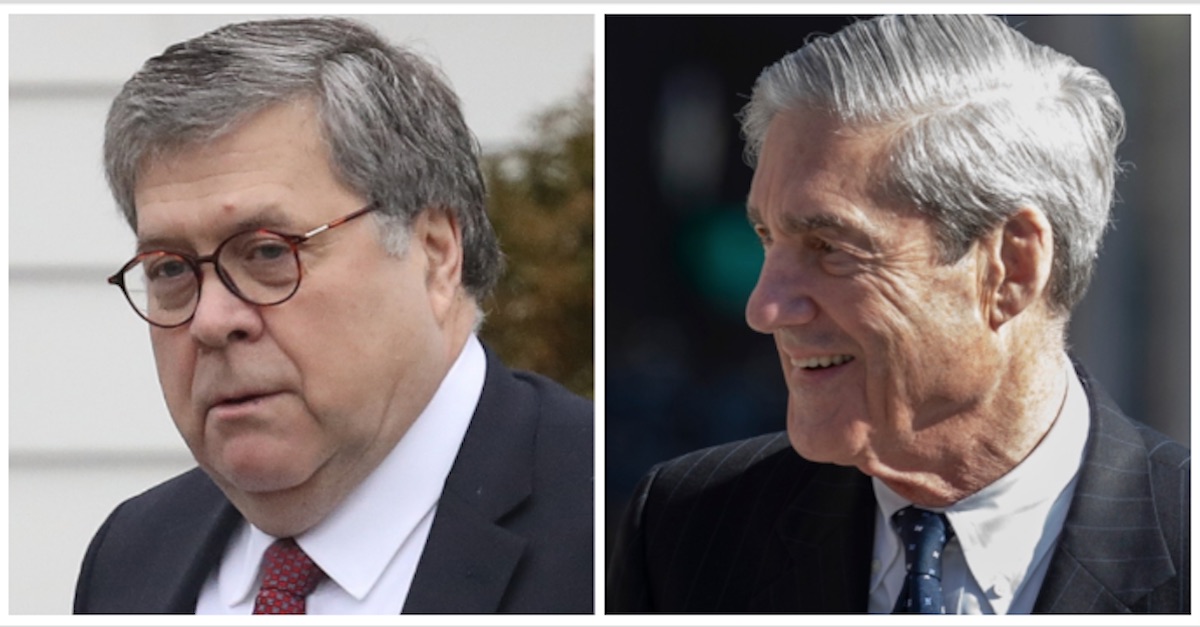
A Department of Justice spokesperson confirmed to the New York Times on Tuesday evening that Special Counsel Robert Mueller was not pleased with Attorney General William Barr‘s four-page letter on the “principle conclusions” of the Russia report.
Mueller reportedly penned a letter of his own to Barr days later to say that he felt the letter “threaten[ed] to undermine” the point of appointing a Special Counsel in the first place by jeopardizing the public’s confidence in the process.
“The summary letter the Department sent to Congress and released to the public late in the afternoon of March 24 did not fully capture the context, nature, and substance of this office’s work and conclusions,” Mueller’s letter said. “There is now public confusion about critical aspects of the results of our investigation. This threatens to undermine a central purpose for which the Department appointed the Special Counsel: to assure full public confidence in the outcome of the investigations.”
DOJ spokeswoman Kerri Kupec confirmed that Mueller sent a letter. DOJ officials, per the Washington Post, were reportedly taken aback by the letter and a “cordial and professional conversation” between Barr and Mueller ensued.
“After the Attorney General received Special Counsel Mueller’s letter, he called him to discuss it,” Kupec said. “In a cordial and professional conversation, the Special Counsel emphasized that nothing in the Attorney General’s March 24 letter was inaccurate or misleading. But, he expressed frustration over the lack of context and the resulting media coverage regarding the Special Counsel’s obstruction analysis. They then discussed whether additional context from the report would be helpful and could be quickly released.”
Mueller and Barr, it has been noted, are friends. Note that Mueller was particularly unnerved about the representation of the “obstruction analysis,” and that it isn’t him saying that but Kupec.
“However, the Attorney General ultimately determined that it would not be productive to release the report in piecemeal fashion,” Kupec added. “The Attorney General and the Special Counsel agreed to get the full report out with necessary redactions as expeditiously as possible. The next day, the Attorney General sent a letter to Congress reiterating that his March 24 letter was not intended to be a summary of the report, but instead only stated the Special Counsel’s principal conclusions, and volunteered to testify before both Senate and House Judiciary Committees on May 1 and 2.”
The complaint from Mueller is bound to create some major waves, as many criticized Barr from the start for his handling of the confidential Russia report. Now that we know Mueller himself has done it, those criticisms appear to have been validated.
Barr noted without using full quotes from the report that Mueller didn’t accuse President Donald Trump of the crime of obstruction of justice, but that he didn’t exonerate him either. Instead of inspiring public confidence, it inspired accusations that Barr was attempting to protect the president. Barr and Deputy Attorney General Rod Rosenstein later said that they concluded that the evidence “wasn’t sufficient” for the charge.
After the report went public, many concluded that the report was more damaging than Barr indicated in his letter. Unidentified members of the Special Counsel’s team also reportedly expressed their misgivings that Barr had downplayed the seriousness of the facts on the obstruction issue.
The president, on the other hand, claimed that he had been “exonerated.”
Mueller took pains to note that it is against DOJ policy to indict a sitting president in his report, leading experts to opine that the obstruction volume of the report was “plainly an impeachment referral.”
[Images via Win McNamee/Getty Images, Tasos Katopodis/Getty Images]